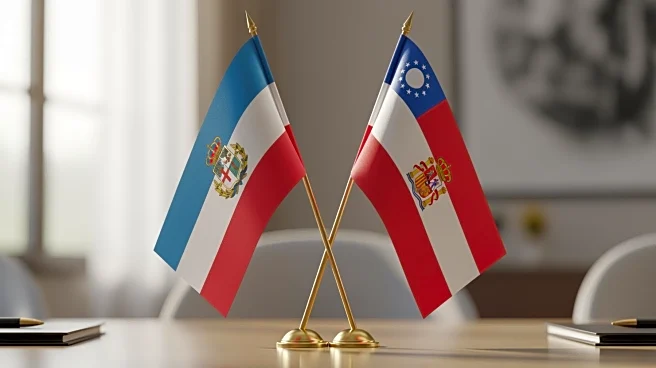What's Happening?
The United Nations Security Council has voted to lift sanctions on Syrian President Ahmad al-Sharaa, days before his meeting with U.S. President Donald Trump at the White House. The resolution, drafted
by Washington, also removes sanctions on Syria's Interior Minister Anas Khattab. The decision was supported by 14 votes, with China abstaining due to concerns over terrorism and security. President Trump praised al-Sharaa's leadership, citing requests from Turkey, Israel, and other countries for the sanctions' removal. The move is part of a broader U.S. policy shift aimed at easing restrictions on Syria and fostering diplomatic relations.
Why It's Important?
The lifting of sanctions represents a significant shift in U.S. foreign policy towards Syria, potentially paving the way for increased diplomatic and economic engagement. It reflects a strategic effort to stabilize the region and integrate Syria into international frameworks. The decision could lead to enhanced cooperation in counterterrorism and regional security, benefiting both Syrian and U.S. interests. However, it also raises concerns about the implications for human rights and the balance of power in the Middle East, with China expressing skepticism over the resolution's approach to security issues.
What's Next?
President Trump is expected to host President al-Sharaa in Washington, marking the first visit by a Syrian president since Syria's independence. During the visit, discussions may focus on Syria joining the U.S.-led anti-Islamic State coalition. The U.S. Congress will need to vote on permanently removing the Caesar Syria Civilian Protection Act sanctions, which remain in place. The visit could further solidify Syria's reintegration into international diplomacy and potentially lead to reconstruction efforts in the war-torn country.
Beyond the Headlines
The resolution's passage highlights the evolving geopolitical dynamics in the Middle East, with Syria seeking to restore ties with Arab countries and the West. The move may influence regional alliances and power structures, as Syria's role in the region is reassessed. The decision also underscores the complexities of international diplomacy, balancing counterterrorism objectives with humanitarian concerns.









